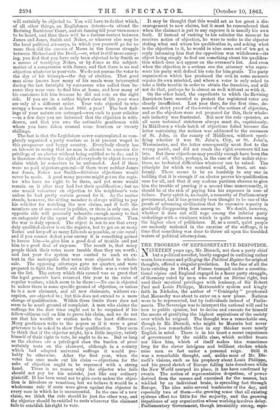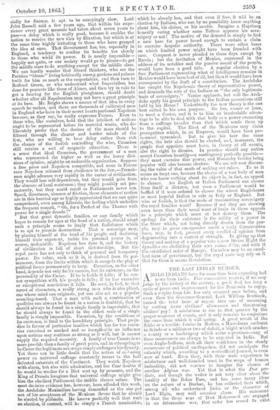THE PROGRESS OF REPRESENTATIVE DESPOTISM. VINETEEN years ago, Mr. Disraeli,
not then a party chief 111 but a political novelist, busily engaged in outlining rather- warm love scenes and pillaging the Political Register for original thoughts, offered a singular prediction. In the face of all the facts existing in 1844, of Franco tranquil under a constitu- tional regime and England engaged in a fierce party struggle,. of Germany ruled by men who rested on Divine right, but used their mystical privileges with leniency, of Sir Robert Peel and Louis Philippe, Metternich's system and kingly faith in Nicholas, the author of " Coningsby " prophesied that Monarchy was about to enter on a new phase. Nations- were to be represented, but by individuals instead of Parlia- ments. The Sovereign was to interpret the national will and to- bow to public opinion, but to devise and execute for himself the means of gratifying the highest aspirations of the society over which he reigned. The thought was a remarkable one, though in Mr. Disraeli, who might be Mazariu but never Cavour, less remarkable than in any thinker more nearly English in mind. There is in his heart a secret impatience of government by the middle class, which neither trusts nor likes him, which of itself makes him sometimes long for the clever intrigues and brilliant strokes which
raise men so fast under a personal reign. Stilt it was a remarkable thought, and, unlike most of Mr. Dis- raeli's visions, such as his prophecy about Louis Philippe, and his grand sketch of Europe falling into decadence while the New World usurped its place, it has been confirmed by events. The notion of representative despotism, of power derived from the masses and exercised for the masses, but wielded by an individual brain, is spreading fast through Europe. The idea suits several tendencies of the day, and especially two of them—the growing sense that all existing systems effect too little for the majority, and the growing impatience of any organization whose working involves delay. Parliamentary Government, though irresistibly strong, espe- daily for finance, is apt to be annoyingly slow. Lord John Russell said a few years ago, that within his expe- rience every great measure had taken about seven years to pass—a delay which is really good, because it enables the nation to receive the new idea by filtration, but which is at the same time highly irritating to those who have grasped the idea at once. That Government has, too, especially in England, a tendency to confine its benefits too closely to those who wield its power. It is nearly impossible— happily not quite, or our society would go to pieces—to get the middle class to do anything except for the middle class. We can hardly wonder that liberal thinkers, who see the Parisian "blouse" living habitually among gardens and palaces
• built for him as much as the respectables, and then turn to Bethnal Green, or who understand what Imperialism has done for peasants like those of Alsace, and then try in vain to get a hearing for the English ploughman, should doubt whether after all Napoleonism may not have a great principle at its base. Mr. Bright shows a nuance of that idea in every speech he makes, and there are thousands of cultivated men in England who have in their secret hearts pardoned Napoleon because, as they say, he really expresses France. Even to those who, like ourselves, hold that the intellect of nations ought to be represented before its material wants, who de- liberately prefer that the desires of the mass should be filtered through the clearer and harder minds of the few, who are willing to bear delay rather than risk the chance of the foolish controlling the wise, Cmsarisw
still retains a sort of magnetic attraction. There is a sense that ideal Cmsarism, the government of a man who represented the higher as well as the lower divi- sions of opinion, might be an endurable organization. Suppose a free press and Napoleon compatible, and none in France save Napoleon released from obedience to the law,—French- men might advance very rapidly in the career of civilization. They would lose self-dependence, but they would gain from the absence of local resistance ; they might possibly act pre- maturely, but they could recoil as Parliaments never can. Speed, directness, absence of friction, these elements of motion are in this hurried age so highly appreciated that we can quite comprehend, even among Liberals, the feeling which underlies the frequent remark, " Oh, for a Prefect of the Thames with power for a single decade !"
But that great dynastic families, or any family which hopes to remain for ages at the head of a nation, should adopt such a principle seems to imply that foolishness which is so apt to precede destruction. That a sovereign may, by placing himself at tho head of his people and declaring himself their exponent, treble his personal power is, of course, undeniable. Napoleon has done it, and the history of civilization is full of short dictatorships. But the royal caste has not only to think of personal and temporary power. Its value, such as it is, is derived from its per- manence, from the limits within which it compels the play of political forces permanently to keep. Cmsarism, on the other hand, depends not only for its success, but its existence, on the personality of the Cresar. If be is feeble it falls ; if he can- not sympathize with his people it falls; if he has excessive or exceptional convictions it falls. He must, in fact, be that rarest of characters, a really strong man who is also pliant, one whose mind can originate, yet can also act as a popular sounding-board. That a man with such a combination of qualities can always be found in a nation is doubtful, that he should always be found in a single family is improbable, that he should always be found in the eldest male of a single family is simply impossible. Cmsarism, by the conditions of its existence, is fatal to the hereditary principle. That preju- dice in favour of particular families which has for ten centu- ries exercised so marked and so inexplicable an influence upon nations may continue as strong as it will, but it cannot supply the required necessity. A family of true Cmsars is no more possible than a family of great poets, and in attempting to be Ctesar the legitimate sovereign simply endangers his dynasty. Yet there can be little doubt that the notion of re-basing power oa universal suffrage constantly recurs to the half defeated autocrats of the Continent. They watch Napoleon with alarm, but also with admiration, and the Czar doubts if he would be weaker for a Diet sent up by peasants, and the King of Prussia imagines that universal suffrage might give him the obedient Parliament the middle classes refuse. The most decisive evidence has, however, been afforded this week, the Archduke Maximilian having demanded as the sine pal non of his acceptance of the Mexican throne that he should be elected by plebiscite. He knows perfectly well that such an election, if coerced, will be simply a French nomination, which he already has, and that even if free, it will bo an election by Indians, who can by no possibility know anything about him, his claims, or his merits. Imagine a Hapsburg honestly caring whether some Toltecs approve his sove- reignty or not ! The motive of the demand is simply to find a new base for power broad enough to sustain a claim to exercise despotic authority. There were other bases on which limited power might have been founded with ease. Conquest is never pleaded in these days except by Russia; but the invitation of Mexico, expressed in the address of its notables and the passive assent of the people, would have been a good title. A regular election by a free Parliament representing what of intelligence remains in Mexico would have been best of all, but then it would have been accompanied by the draft of a constitution. The Archduke has caught the Napoleonic theory of representative power, and demands the vote of the Indians as " the only legitimate basis of sovereignty." Venice applauds, but will the Arch- duke apply his grand principle to the Italian possessions still held by his House? Undoubtedly the new theory is the one best suited to his own purpose. He has, sooner or later,. to meet a Corks, and it is to him an incalculable advan- tage to be able to deal with that body as a 'power emanating from a suffrage broader than that which sends them up to the capital. The Elect of the Mexicans may claim prerogatives which, iu an Emperor, would have been pro- nounced tyrannical. But to give his heir the same rights, the heir also should be elected, and, moreover, the people that appoints must have, in theory at all events, also the right to dismiss. In practice should any nation accept Cmsarism heartily—a contingency perfectly possible— they must exercise this power, and Monarchy besides being popular will also become elective. We are not now discuss- ing the value of that mode of seeking out rulers. To us it seems an inept one, because the choice of a vast body of men who can know nothing about its object is, in fact, an appeal to chance. An English or Italian Parliament can choose from itself a dictator, but even a Parliament would be baffled if it were ordered to choose the wisest Englishman or most hopeful Italian to rule in Italy or England. But wise or foolish, is that the mode of transmitting sovereignty the royal families want? Because if not they arc showing even more than their usual want of brain in these appeals to a principle which must at last destroy them. The apology for their existence is the utility of a power in the State which, not being directly drawn from the peo- ple, may in great emergencies exert a truly Conservative force, may, in fact, prevent every millet of opinion from degenerating into a contest of strength. Iu giving up that theory and making of a popular vote a new Divine Right the dynasties are abolishing their own raison detre, and with it the established order of Europe. Cmsarism may be an excel- lent form of government, but the royal caste may rely on it that for them it means Revolution.































 Previous page
Previous page